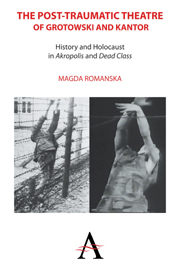 The Post-traumatic Theatre of Grotowski and Kantor
The Post-traumatic Theatre of Grotowski and Kantor from Part II - Our Memory: Kantor's Dead Class
Following Kantor's death in 1990, Dead Class was performed by his actors in Poland and abroad for a short while. The same year, the play was again staged in New York, but without Kantor's presence, it lost some of its magic. As Mel Gussow poignantly notes:
Kantor's early opus, The Dead Class, returned this week to La MaMa to reintroduce theatergoers to the work of this icon of experimentalist drama. The director died in December and his company, Cricot 2, is carrying on his work. In the company's previous visits to the United States, all of them at La MaMa, Kantor was himself integral to the performance. A brooding totemic figure, he appeared onstage with his actors, serving as conductor, stagehand and silent watchman. His presence added an immeasurable dimension to the theatrical experience.
The play was last performed in 1992, by Cricot 2 in Prague and Bremen. It was then that they decided to dissolve the troupe. Some eventually regrouped into an ensemble called Former Cricot-2 Actors. Others considered such an idea sacrilege.
In 2001 Krzysztof Miklaszewski directed Scenes from Dead Class, performed by the graduates of the Academy of Theatrical Practices, which was founded by the Gardzienice Theatre. Kantor would have rolled over in his grave – the Gardzienice Theatre is rooted in Grotowski's tradition (the company founder, Włodzimierz Staniewski, collaborated with Grotowski for years, until in 1977 he founded his own company).
To save this book to your Kindle, first ensure no-reply@cambridge.org is added to your Approved Personal Document E-mail List under your Personal Document Settings on the Manage Your Content and Devices page of your Amazon account. Then enter the ‘name’ part of your Kindle email address below. Find out more about saving to your Kindle.
Note you can select to save to either the @free.kindle.com or @kindle.com variations. ‘@free.kindle.com’ emails are free but can only be saved to your device when it is connected to wi-fi. ‘@kindle.com’ emails can be delivered even when you are not connected to wi-fi, but note that service fees apply.
Find out more about the Kindle Personal Document Service.
To save content items to your account, please confirm that you agree to abide by our usage policies. If this is the first time you use this feature, you will be asked to authorise Cambridge Core to connect with your account. Find out more about saving content to Dropbox.
To save content items to your account, please confirm that you agree to abide by our usage policies. If this is the first time you use this feature, you will be asked to authorise Cambridge Core to connect with your account. Find out more about saving content to Google Drive.